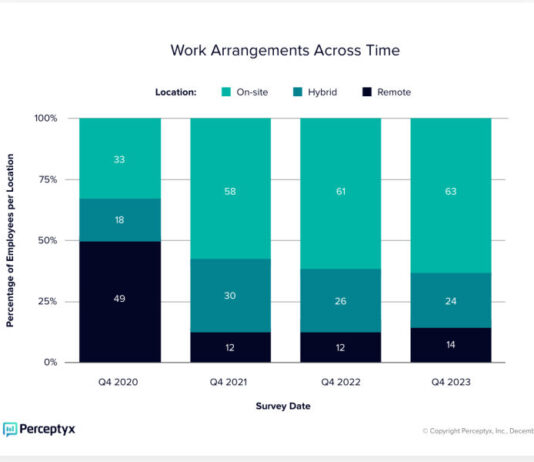Whatever the predictions, the percentage of workers in remote and hybrid roles has remained stable since the end of the pandemic, according to research from Perceptyx. And, the past two years have seen no statistical change in the overall proportion of employees working on-site.
However, the behavior of new employees...
The labor market remains active but is cooling off, the Conference Board said, a trend it expects to continue until 2024’s second quarter, when job losses will begin. The board expects the unemployment rate will rise to 4.3% during the second half.
The organization’s Employment Trends Index dropped to 113.05...
Well more than half of U.S. businesses, 58%, regret at least one of the software purchases they made in the last 12 to 18 months. Moreover, said Capterra, nearly a quarter, 23%, regret multiple purchases they made during that same time.
The primary reasons for their regret included the...
A significant portion of job seekers are abandoning the hiring process due to poor experiences, according to a recent study by Greenhouse.The company’s 2023 Candidate Interview Experience Report found that job seekers are experiencing red flags and other “warning signs” including poor communication, negative interviews, companies avoiding questions about...
The push by employers to return employees to their offices is creating new hiring challenges for their talent acquisition efforts. According to The Wall Street Journal, the effort is creating reluctance among potential hires that have become accustomed to flexible work arrangements. Notably, CIO and CTO roles are becoming...
Even as other industry segments suffer in the midst of a mixed economy, investors remain active in the HR technology space. During 2022, investors put $11.4 billion into the space, down from $13.3 billion the previous year, according to investment bank Houlihan Lokey.
But even if investments are slowing down,...
The recent Supreme Court ruling on affirmative action and a slew of threatening letters from advocacy groups to employers have combined with economic uncertainty to temper hopes of continued progress in corporate DEI programs. But those rumors, as the saying goes, may be greatly exaggerated.
In a survey by Capterra,...
Most private companies plan to raise capital this year -- the great majority of them to fund talent and technology initiatives.
More than 90% of the private companies surveyed by Deloitte expect to raise capital this year to fund growth-driven talent efforts. They're primarily looking for equity financing and existing...
Fifty-seven percent of employees want to stay at their current jobs, according to a recent study from HireClix. However, the survey showed that when workers do want to leave, it’s in hopes of better pay, work-life balance or more enjoyable work.
“As employers dedicate significant time, money and resources building...
Transcript
Mark:Welcome to People Tech, the podcast of the HCM Technology Report. I'm Mark Feffer. My guest today is Kim Rohrer, the principal people partner at Oyster HR. They're a global employment platform and earlier this year they published a study looking at why employees are disillusioned....





















